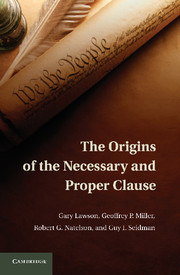Book contents
- Frontmatter
- Contents
- Acknowledgments
- 1 Raiders of the Lost Clause
- 2 Discretionary Grants in Eighteenth-Century English Legislation
- 3 An Ocean Away
- 4 The Legal Origins of the Necessary and Proper Clause
- 5 The Framing and Adoption of the Necessary and Proper Clause
- 6 Necessity, Propriety, and Reasonableness
- 7 The Corporate Law Background of the Necessary and Proper Clause
- Index
- References
1 - Raiders of the Lost Clause
Excavating the Buried Foundations of the Necessary and Proper Clause
Published online by Cambridge University Press: 03 May 2011
- Frontmatter
- Contents
- Acknowledgments
- 1 Raiders of the Lost Clause
- 2 Discretionary Grants in Eighteenth-Century English Legislation
- 3 An Ocean Away
- 4 The Legal Origins of the Necessary and Proper Clause
- 5 The Framing and Adoption of the Necessary and Proper Clause
- 6 Necessity, Propriety, and Reasonableness
- 7 The Corporate Law Background of the Necessary and Proper Clause
- Index
- References
Summary
The U.S. Constitution creates a national government of limited and enumerated powers. More precisely, it creates a set of institutions of national governance of limited and enumerated powers. The Constitution never grants power to the “national government” or the “federal government” as an undifferentiated entity, but instead grants various aspects of governmental power to discrete actors. The president is vested with the “executive Power,” the federal courts are vested with the “judicial Power,” and Congress is vested with a range of specified “legislative Powers,” primarily though not exclusively identified in Article I, section 8 of the document, including the power to lay and collect taxes, borrow money, regulate various types of commerce, and provide for a military. The first seventeen clauses in Article I, section 8 identify (depending upon how one counts) roughly two dozen such legislative powers.
The eighteenth and last clause in Article I, section 8 grants Congress power “[t]o make all Laws which shall be necessary and proper for carrying into Execution the foregoing Powers, and all other Powers vested by this Constitution in the Government of the United States, or in any Department or Officer thereof.” Antifederalist critics of the Constitution pejoratively dubbed this provision “the Sweeping Clause,” arguing that it granted dangerously broad and ill-defined powers to the new national government.
- Type
- Chapter
- Information
- The Origins of the Necessary and Proper Clause , pp. 1 - 12Publisher: Cambridge University PressPrint publication year: 2010
References
- 1
- Cited by



